外研版七年级上册 Module 7 Unit 3 Language in use 课件 (共25张PPT)
文档属性
| 名称 | 外研版七年级上册 Module 7 Unit 3 Language in use 课件 (共25张PPT) | 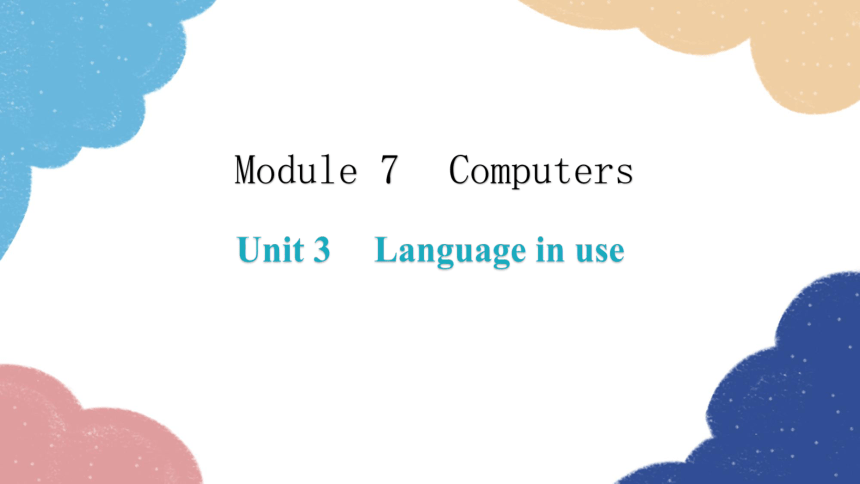 | |
| 格式 | pptx | ||
| 文件大小 | 416.3KB | ||
| 资源类型 | 教案 | ||
| 版本资源 | 外研版 | ||
| 科目 | 英语 | ||
| 更新时间 | 2022-11-07 19:37:07 | ||
图片预览


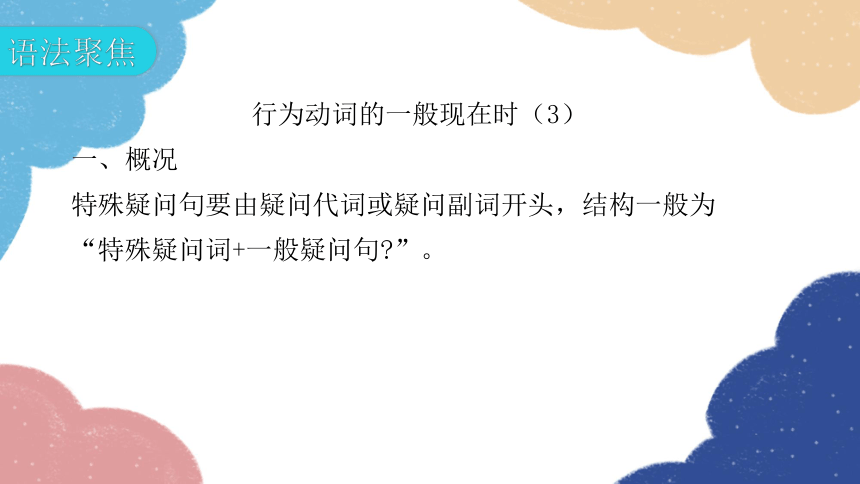

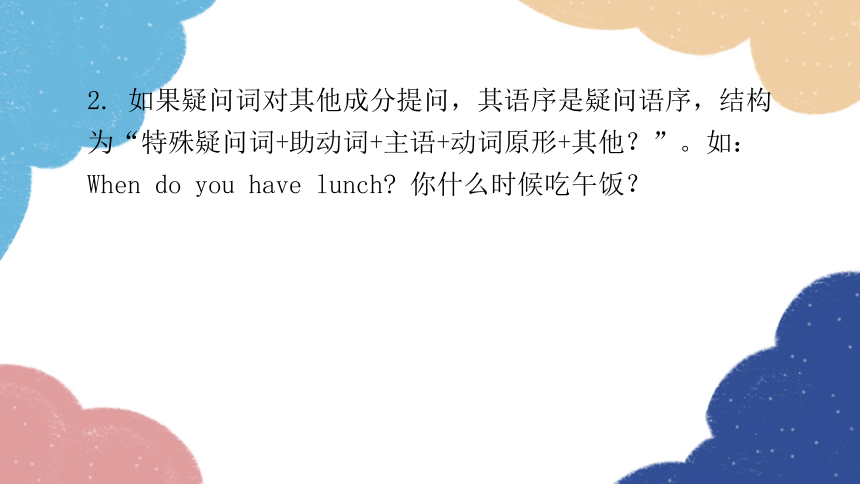
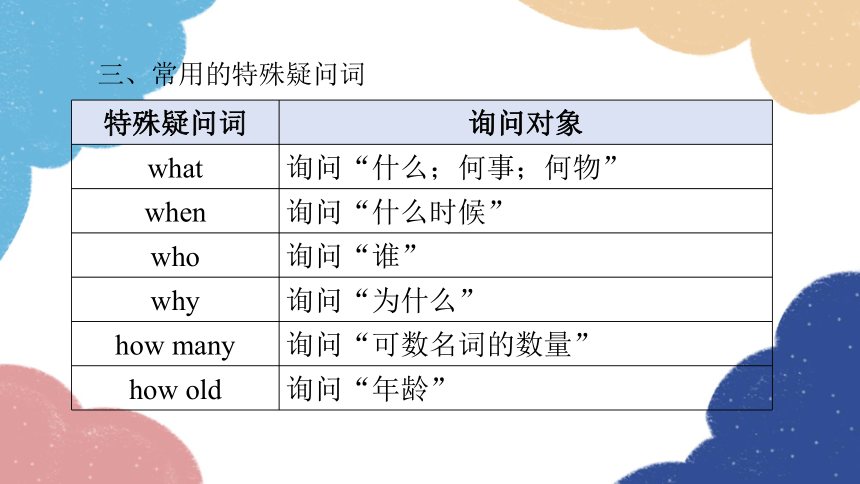
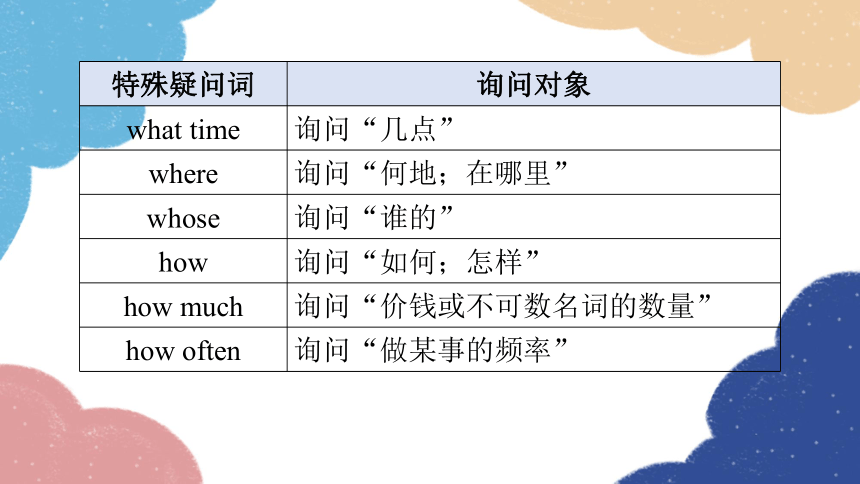
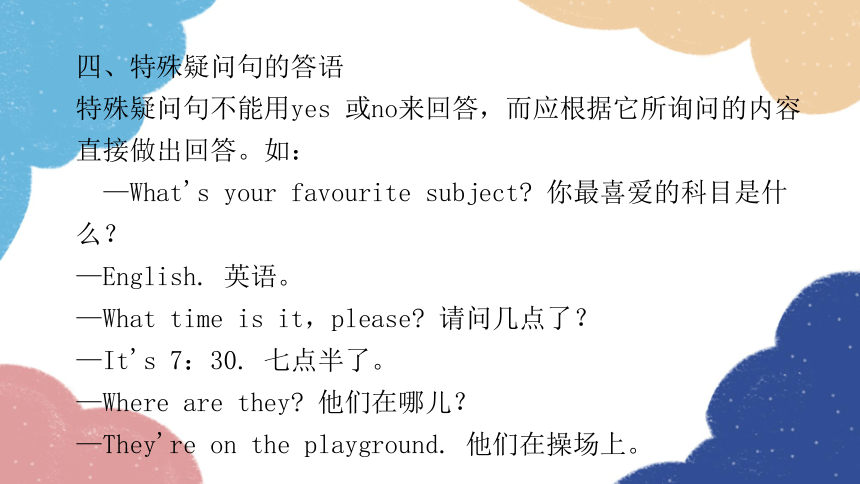
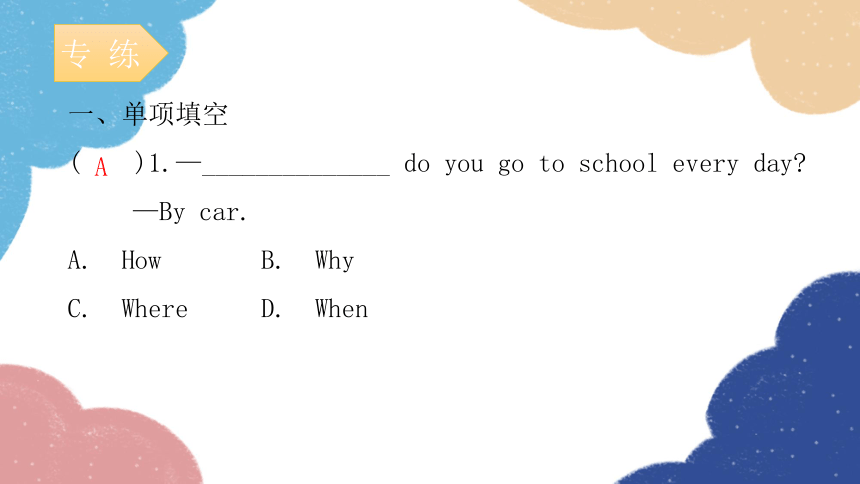
文档简介
(共25张PPT)
Module 7 Computers
Unit 3 Language in use
目录
02
课堂小测
03
课后作业
01
语法聚焦
行为动词的一般现在时(3)
一、概况
特殊疑问句要由疑问代词或疑问副词开头,结构一般为“特殊疑问词+一般疑问句 ”。
语法聚焦
二、特殊疑问句的语序
1. 如果疑问词在句子中作主语或作主语的定语,即对主语或主语的定语提问,其语序是陈述语序,结构为“特殊疑问词(+主语)+谓语动词+其他?”。如:
Whose bike is here 谁的自行车在这儿?
Who can drive a car 谁会开车?
2. 如果疑问词对其他成分提问,其语序是疑问语序,结构为“特殊疑问词+助动词+主语+动词原形+其他?”。如:
When do you have lunch 你什么时候吃午饭?
三、常用的特殊疑问词
特殊疑问词 询问对象
what 询问“什么;何事;何物”
when 询问“什么时候”
who 询问“谁”
why 询问“为什么”
how many 询问“可数名词的数量”
how old 询问“年龄”
特殊疑问词 询问对象
what time 询问“几点”
where 询问“何地;在哪里”
whose 询问“谁的”
how 询问“如何;怎样”
how much 询问“价钱或不可数名词的数量”
how often 询问“做某事的频率”
四、特殊疑问句的答语
特殊疑问句不能用yes 或no来回答,而应根据它所询问的内容直接做出回答。如:
—What's your favourite subject 你最喜爱的科目是什么?
—English. 英语。
—What time is it,please 请问几点了?
—It's 7:30. 七点半了。
—Where are they 他们在哪儿?
—They're on the playground. 他们在操场上。
一、单项填空
( )1.—______________ do you go to school every day
—By car.
A. How B. Why
C. Where D. When
专 练
A
( )2. —______________ do you like swimming
—Because it can make me strong and healthy.
A. Whose B. What
C. Why D. Who
C
( )3. —______________ does your mother do in the evening
—She cooks dinner for us.
A. When B. What
C. How D. Why
B
( )4. —______________ do you usually share joy(快乐)with
—My parents and my best friend.
A. Who B. Whose
C. What D. How
A
( )5. —______________ do the students have science
—In the science lab.
A. What B. Why
C. Where D. When
C
二、根据要求完成句子,每空一词
6. Jason's father works in Australia.(就画线部分提问)
_________ ________ Jason's father ______________
7. Tim is 8 years old and he can go to school by himself.(就画线部分提问)
______________ ______________ ______________ Tim
Where
does
work
How
old
is
8. Julie usually searches for information on the Internet.(就画线部分提问)
______________ ______________ Julie usually _____________ on the Internet
9. My sister goes shopping every Sunday.(就画线部分提问)
______________ ______________ shopping every Sunday
What
does
do
Who
goes
10. Cindy sends twenty cards to her friends every month.(就画线部分提问)
______________ ______________ cards ______________ Cindy ______________ to her friends
How
many
does
send
课堂小测
customers
ften
一、根据中文意思或首字母提示,用单词的适当形式填空,每空一词
1. There are many______________ (顾客) in this shop every day.
2. My father ______________ makes travel plans on the Internet.
3. I like to send ______________ to my parents every day.
o
e
mail
4. ______________ (有时候) his father buys train tickets on the Internet.
5. My father's ______________ (公司)is near our home,so he goes to work on foot every day.
Sometimes
company
二、根据汉语意思完成句子,词数不限
6. 网上有许多信息。
There____________ a lot of ________________ on the Internet.
7.你每天写多少作业?
____________________________ do you write every day
is
information
How much homework
8.谁家里没有电脑?
_______________________ computers at home
9. 让我们先制定我们的旅行计划吧。
Let's make our _______________________ first.
10.他们通常用电脑上网并用它做作业。
They usually______________ the Internet and ______________ the computer to do their homework.
Who doesn't have
travel plans
go on
use
三、语法选择
Now many of us like going on the Internet very much.
Do you know __11__ That's because the Internet can make __12__ lives interesting. We can get a lot of information on __13__ Internet. We can also__14__ English on the Internet.There are some good books and magazines online. We can read __15__ at any time. You don't need to pay money for reading __16__ they are free(免费的). Do you like playing computer games Many students say puter games are popular among young people.
But some of the young people spend __17__ time playing computer games. Playing computer games for long __18__ not good for your study.
Do you know it's not good for your body either Watching the screen for long is bad for your __19__. Sitting for long is bad for your back. So I don't think we should spend too much time __20__ computer games.
That's all for today. Thank you.
( )11. A. when B. why C. where
( )12. A. we B. our C. us
( )13. A. a B. an C. the
( )14. A. learn B. to learn C. learning
( )15. A. they B. them C. their
B
B
C
A
B
( )16. A. so B. but C. because
( )17. A. too much B. much too C. too many
( )18. A. am B. is C. are
( )19. A. eye B. eyes C. eyes'
( )20. A. in B. with C. on
C
A
B
B
C
THANKS!
Module 7 Computers
Unit 3 Language in use
目录
02
课堂小测
03
课后作业
01
语法聚焦
行为动词的一般现在时(3)
一、概况
特殊疑问句要由疑问代词或疑问副词开头,结构一般为“特殊疑问词+一般疑问句 ”。
语法聚焦
二、特殊疑问句的语序
1. 如果疑问词在句子中作主语或作主语的定语,即对主语或主语的定语提问,其语序是陈述语序,结构为“特殊疑问词(+主语)+谓语动词+其他?”。如:
Whose bike is here 谁的自行车在这儿?
Who can drive a car 谁会开车?
2. 如果疑问词对其他成分提问,其语序是疑问语序,结构为“特殊疑问词+助动词+主语+动词原形+其他?”。如:
When do you have lunch 你什么时候吃午饭?
三、常用的特殊疑问词
特殊疑问词 询问对象
what 询问“什么;何事;何物”
when 询问“什么时候”
who 询问“谁”
why 询问“为什么”
how many 询问“可数名词的数量”
how old 询问“年龄”
特殊疑问词 询问对象
what time 询问“几点”
where 询问“何地;在哪里”
whose 询问“谁的”
how 询问“如何;怎样”
how much 询问“价钱或不可数名词的数量”
how often 询问“做某事的频率”
四、特殊疑问句的答语
特殊疑问句不能用yes 或no来回答,而应根据它所询问的内容直接做出回答。如:
—What's your favourite subject 你最喜爱的科目是什么?
—English. 英语。
—What time is it,please 请问几点了?
—It's 7:30. 七点半了。
—Where are they 他们在哪儿?
—They're on the playground. 他们在操场上。
一、单项填空
( )1.—______________ do you go to school every day
—By car.
A. How B. Why
C. Where D. When
专 练
A
( )2. —______________ do you like swimming
—Because it can make me strong and healthy.
A. Whose B. What
C. Why D. Who
C
( )3. —______________ does your mother do in the evening
—She cooks dinner for us.
A. When B. What
C. How D. Why
B
( )4. —______________ do you usually share joy(快乐)with
—My parents and my best friend.
A. Who B. Whose
C. What D. How
A
( )5. —______________ do the students have science
—In the science lab.
A. What B. Why
C. Where D. When
C
二、根据要求完成句子,每空一词
6. Jason's father works in Australia.(就画线部分提问)
_________ ________ Jason's father ______________
7. Tim is 8 years old and he can go to school by himself.(就画线部分提问)
______________ ______________ ______________ Tim
Where
does
work
How
old
is
8. Julie usually searches for information on the Internet.(就画线部分提问)
______________ ______________ Julie usually _____________ on the Internet
9. My sister goes shopping every Sunday.(就画线部分提问)
______________ ______________ shopping every Sunday
What
does
do
Who
goes
10. Cindy sends twenty cards to her friends every month.(就画线部分提问)
______________ ______________ cards ______________ Cindy ______________ to her friends
How
many
does
send
课堂小测
customers
ften
一、根据中文意思或首字母提示,用单词的适当形式填空,每空一词
1. There are many______________ (顾客) in this shop every day.
2. My father ______________ makes travel plans on the Internet.
3. I like to send ______________ to my parents every day.
o
e
4. ______________ (有时候) his father buys train tickets on the Internet.
5. My father's ______________ (公司)is near our home,so he goes to work on foot every day.
Sometimes
company
二、根据汉语意思完成句子,词数不限
6. 网上有许多信息。
There____________ a lot of ________________ on the Internet.
7.你每天写多少作业?
____________________________ do you write every day
is
information
How much homework
8.谁家里没有电脑?
_______________________ computers at home
9. 让我们先制定我们的旅行计划吧。
Let's make our _______________________ first.
10.他们通常用电脑上网并用它做作业。
They usually______________ the Internet and ______________ the computer to do their homework.
Who doesn't have
travel plans
go on
use
三、语法选择
Now many of us like going on the Internet very much.
Do you know __11__ That's because the Internet can make __12__ lives interesting. We can get a lot of information on __13__ Internet. We can also__14__ English on the Internet.There are some good books and magazines online. We can read __15__ at any time. You don't need to pay money for reading __16__ they are free(免费的). Do you like playing computer games Many students say puter games are popular among young people.
But some of the young people spend __17__ time playing computer games. Playing computer games for long __18__ not good for your study.
Do you know it's not good for your body either Watching the screen for long is bad for your __19__. Sitting for long is bad for your back. So I don't think we should spend too much time __20__ computer games.
That's all for today. Thank you.
( )11. A. when B. why C. where
( )12. A. we B. our C. us
( )13. A. a B. an C. the
( )14. A. learn B. to learn C. learning
( )15. A. they B. them C. their
B
B
C
A
B
( )16. A. so B. but C. because
( )17. A. too much B. much too C. too many
( )18. A. am B. is C. are
( )19. A. eye B. eyes C. eyes'
( )20. A. in B. with C. on
C
A
B
B
C
THANKS!
同课章节目录
- Starte
- Module 1 My teacher and my friends
- Module 2 My English lesson
- Module 3 My English book
- Module 4 My everyday life
- Module 1 My classmates
- Unit 1 Nice to meet you.
- Unit 2 I'm Wang Lingling and I'm thirteen years ol
- Unit 3 Language in use.
- Module 2 My family
- Unit 1 Is this your mum?
- Unit 2 These are my parents.
- Unit 3 Language in use.
- Module 3 My school
- Unit 1 There are thirty students in my class.
- Unit 2 The library is on the left of the playgroun
- Unit 3 Language in use.
- Module 4 Healthy food
- Unit 1 We've got lots of apples.
- Unit 2 Is your food and drink healthy?
- Unit 3 Language in use.
- Module 5 My school day
- Unit 1 I love history.
- Unit 2 We start work at nine o'clock.
- Unit 3 Language in use.
- Revision module A
- Module 6 A trip to the zoo
- Unit 1 Does it eat meat?
- Unit 2 The tiger lives in Asia.
- Unit 3 Language in use.
- Module 7 Computers
- Unit 1 How do I write my homework on the computer?
- Unit 2 When do you use a computer?
- Unit 3 Language in use.
- Module 8 Choosing presents
- Unit 1 I always like birthday parties.
- Unit 2 She often goes to concerts.
- Unit 3 Language in use.
- Module 9 People and places
- Unit 1 We're enjoying the school trip a lot.
- Unit 2 They're waiting for buses or trains.
- Unit 3 Language in use.
- Module 10 Spring Festival
- Unit 1 Are you getting ready for Spring Festival?
- Unit 2 My mother's cleaning our houses and sweepin
- Unit 3 Language in use.
- Revision module B
